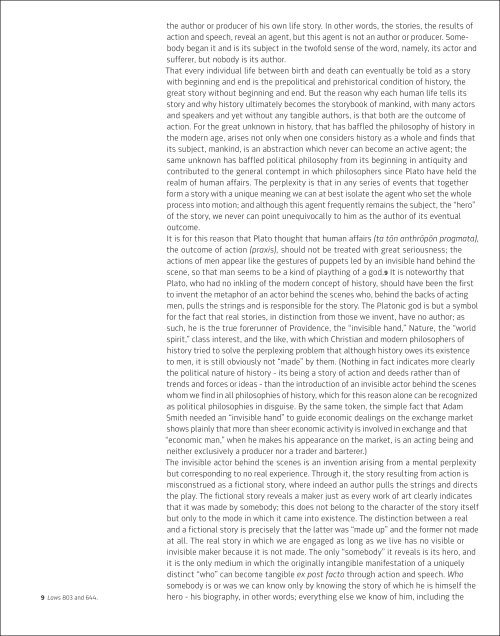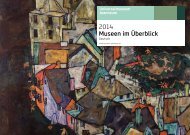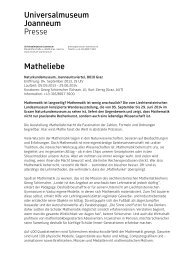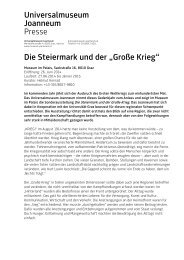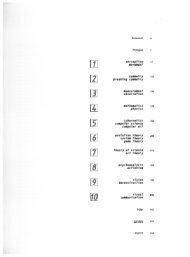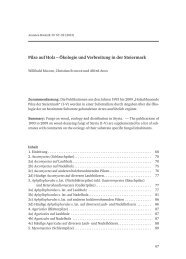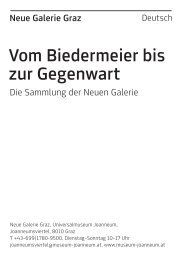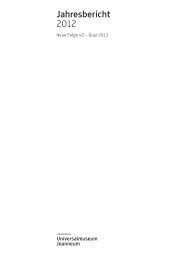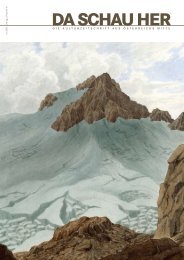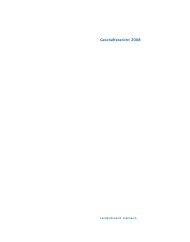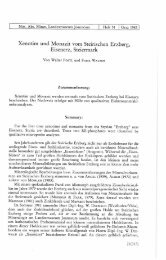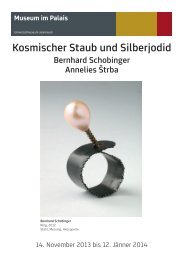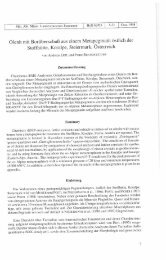Human Condition - Universalmuseum Joanneum
Human Condition - Universalmuseum Joanneum
Human Condition - Universalmuseum Joanneum
Sie wollen auch ein ePaper? Erhöhen Sie die Reichweite Ihrer Titel.
YUMPU macht aus Druck-PDFs automatisch weboptimierte ePaper, die Google liebt.
9 Laws 803 and 644.<br />
the author or producer of his own life story. In other words, the stories, the results of<br />
action and speech, reveal an agent, but this agent is not an author or producer. Somebody<br />
began it and is its subject in the twofold sense of the word, namely, its actor and<br />
sufferer, but nobody is its author.<br />
That every individual life between birth and death can even tually be told as a story<br />
with beginning and end is the prepolitical and prehistorical condition of history, the<br />
great story without beginning and end. But the reason why each human life teIls its<br />
story and why history ultimateIy becomes the storybook of man kind, with many actors<br />
and speakers and yet without any tangible authors, is that both are the outcome of<br />
action. For the great unknown in history, that has baffled the philosophy of history in<br />
the modern age, arises not only when one considers history as a whole and finds that<br />
its subject, mankind, is an abstraction which never can become an active agent; the<br />
same unknown has baffled political philosophy from its beginning in antiquity and<br />
contrib uted to the general contempt in which philosophers since Plato have held the<br />
realm of human affairs. The perplexity is that in any series of events that together<br />
form a story with a unique mean ing we can at best isolate the agent who set the whole<br />
process into motion; and although this agent frequently remains the subject, the “hero”<br />
of the story, we never can point unequivocally to him as the author of its eventual<br />
outcome.<br />
It is for this reason that Plato thought that human affairs (ta tōn anthrōpōn pragmata),<br />
the outcome of action (praxis), should not be treated with great seriousness; the<br />
actions of men appear like the gestures of puppets led by an invisible hand behind the<br />
scene, so that man seems to be a kind of plaything of a god.9 It is note worthy that<br />
Plato, who had no inkling of the modern concept of history, should have been the first<br />
to invent the metaphor of an actor behind the scenes who, behind the backs of acting<br />
men, pulls the strings and is responsible for the story. The Platonic god is but a symbol<br />
for the fact that real stories, in distinction from those we invent, have no author; as<br />
such, he is the true forerunner of Providence, the “invisible hand,” Nature, the “world<br />
spirit,” class interest, and the like, with which Christian and modern philosophers of<br />
history tried to solve the perplexing problem that although history owes its existence<br />
to men, it is still obviously not “made” by them. (Nothing in fact indicates more clearly<br />
the political nature of history - its being a story of action and deeds rather than of<br />
trends and forces or ideas - than the introduction of an invisible actor behind the scenes<br />
whom we find in all philoso phies of history, which for this reason alone can be recognized<br />
as political philosophies in disguise. By the same token, the simple fact that Adam<br />
Smith needed an “invisible hand” to guide econom ic dealings on the exchange market<br />
shows plainly that more than sheer economic activity is involved in exchange and that<br />
“eco nomic man,” when he makes his appearance on the market, is an acting being and<br />
neither exclusiveIy a producer nor a trader and barterer.)<br />
The invisible actor behind the scenes is an invention arising from a mental perplexity<br />
but corresponding to no real experience. Through it, the story resulting from action is<br />
misconstrued as a fictional story, where indeed an author pulls the strings and directs<br />
the play. The fictional story reveals a maker just as every work of art clearly indicates<br />
that it was made by somebody; this does not belong to the character of the story itself<br />
but only to the mode in which it came into existence. The distinction between a real<br />
and a fictional story is precisely that the latter was “made up” and the former not made<br />
at all. The real story in which we are engaged as long as we live has no visible or<br />
invisible maker be cause it is not made. The only “somebody” it reveals is its hero, and<br />
it is the only medium in which the originally intangible mani festation of a uniquely<br />
distinct “who” can become tangible ex post facto through action and speech. Who<br />
somebody is or was we can know only by knowing the story of which he is himself the<br />
hero - his biography, in other words; everything else we know of him, including the


